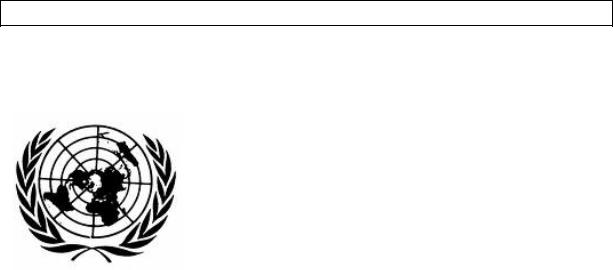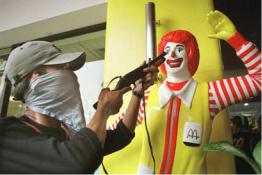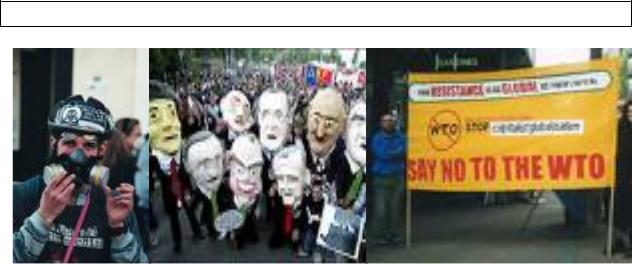
зеленый
.pdf
Unit 6
Global Affairs
In this module you will:
Read about Microsoft company
Talk about pros and cons of globalisation
Test your knowledge about the United Nations
Practise talking about the past
Listen to a talk about globalisation process
Write a for and against essay
Learn about Mc Donald’s, Fiat, Samsung
Useful vocabulary:
Nouns |
headquarters, justice, rights, department, staff, spokesperson, |
|
campus, employee, chairman, customer, ambassador, assistant, |
|
committee, branch, tax, brand, government, advantage, |
|
disadvantage, criminal |
Verbs |
to manage, to produce, to support, to employ, to be set up, to |
|
concentrate on, to launch, to release, to aim at sb/smth, to export, |
|
to be sentenced to, to affect smth |
Adjectives |
responsible for, powerful, private |
Phrases and |
to solve problems, legal action, civil servant, unfair competition, |
collocations |
to be in charge of smth, giant companies, fizzy drinks, CCTV |
|
cameras, anti-globalisation movement, economic integration, |
|
financial institutions, international trade |
Linkers |
although, therefore, on the other hand |
62

1. Lead-in
1a What do you know about the United Nations (the UN)? Answer these questions with a partner.
1When was the UN founded?
2How many countries are now UN members?
3Where is the UN headquarters?
4Where is the current Secretary General from?
5Which of these activities is the UN not involved with?
Aid and peace keeping
Religious education
International justice
Children’s rights
Economic development
Entertainment
 1b Listen and check your knowledge. Track 15.
1b Listen and check your knowledge. Track 15.
1c Read this entry from an encyclopaedia. What is its main subject?
1 the work of the United Nations
2 celebrities who work for the Secretary General
3 the Secretary General and his/her department
THE UNITED NATIONS is an organisation that works in many different areas. In order to carry out its work, the UN has a large department of international civil servants (the Secretariat). The head of this UN department is the Secretary General and there are about 9,000 other staff members. The Secretary General is responsible for the day-to-day organisation of the UN and its many projects.
As well as these work responsibilities, the Secretary General is a symbol or face of the UN. He or she is also a spokesperson for the people of the world and can ask the UN to help with difficult situations in the world.
The Secretary General also chooses the Messengers of Peace. These people publicise the work of the UN and they are chosen from the fields of arts, literature and sports. Messengers of Peace have included Luciano Pavarotti (opera singer) and Muhammad Ali (boxer).
1d Are these statements true (T) or false (F), or does the text not say (DS)?
1The UN helps protect endangered animals.
2The Secretariat manages the UN’s daily business.
3The Secretary General is very well paid.
4The Secretary General can request that the UN solves a problem.
63

5The countries in the United Nations select the Messengers of Peace.
6The Messengers of Peace tell the world about the UN’s work.
7Politicians can become Messengers of Peace.
2.Reading
Pre-reading activities
2a Look at this list of companies and answer the questions.
1What do they do/produce?
2In which country did they start?
3Would you like to work for them?
BP Coca-Cola Fiat Google
Honda IBM McDonald’s Nestle
Nintendo Nokia Philips
Samsung Shell Sony
While-reading activities
2b Read the text about Microsoft and choose the correct phrase/ sentence from A-F to fill in gaps 1-5. There is one sentence that you won’t need to use.
ABill Gates himself has given over $30 billion to support projects in global health and learning
Bit is now published in 26 languages and is available in more than 60 countries
CBill has mixed feelings about spending so much time running Microsoft
Dthat was designed to run on a computer
Eso they started to develop software for personal computers
F by the end of that decade, however, attitudes were changing in the USA
Growth of a Global Giant
Today Microsoft employs more than 55,000 people in 85 countries and regions. In 2006, the company made profits of US$ 12.6 billion. But it wasn’t always that way …
The seventies and eighties
(1975-1989)
Microsoft was set up in Albuquerque (New Mexico, USA) in 1975 by Bill Gates and his friend Paul Allen. The
two men were guided by a belief that every desk in every office, and every home, should have a computer, 1) . At first, the company concentrated on selling to
64

businesses. In the late 1970s, Microsoft moved to the Seattle area. It is still based there today, on its own ‘corporate campus’ in Redmond. In the mid 1980s, Microsoft was growing rapidly and chose the Republic of Ireland as the Location of its first production facility outside the USA.
2) , and the company was criticized for making its employees work too hard!
The nineties (1990-1999) 1994 Microsoft Encarta was launched – the first encyclopaedia
3______ __________. The company slogan was also changed to: ‘Where do you want to go today?’
1995 Windows 95 was released, and more than a million copies were sold in the first four days. The company focus moved from business to the consumer. MSN, the Microsoft Network online service, was also launched, and quickly became one of the largest Internet service providers.
1996 Microsoft was named the company that Americans respected and admired the most.
1997 Microsoft opened its headquarters in India, now the second largest after its US headquarters.
1999 Gates’s book Business @ the Speed of Thought was published. The book shows how computer
technology can solve |
business |
||
problems in new ways. |
|
|
|
4) |
|
|
. |
The ‘noughties’ (since 2000) 2001 Windows XP was released worldwide.
2004 Microsoft gave $3.5 million for relief and recovery efforts after the Asian tsunami.
5) . In this
year Microsoft faced legal action from the European Union for unfair competition.
2006 Plans were announced to develop the campus in Redmond. 2007 Microsoft Windows Vista was launched.
Post-reading activities
2c Which decade do the following statements go with?
1People in the USA thought that Microsoft was top company.
2The company started making software abroad.
3Sales of one particular product were very good.
4Microsoft helped people after the terrible events in the Indian Ocean.
5Gates and Allen started the company.
6Microsoft became more interested in selling computers to people than to companies.
7Microsoft had problems in Europe.
65

2d Find words in the text that mean: |
|
|
|
1 |
an idea that you think is true |
4 |
an area of land where company (or |
2 |
the programs that a computer uses |
|
university) buildings are |
|
to do different jobs |
5 |
a short, clever phrase that is used in |
3 |
gave most of its time or attention |
|
advertising |
|
to this |
6 |
made a new product available |
2e Using your own words answer the questions.
How did Microsoft change between 1975 and 2007?
What do you think were the three most important years for Microsoft?
3. Language skills
3a Make questions about the start of the Italian company Fiat. Then listen and check your questions and answers to them.
1When / Fiat / set up? When was Fiat set up?
2Where / cars / test / in the early years?
3When / car adverts / aim / at women for the first time?
4Which newspaper / buy / by Fiat in 1926, Corriere della Sera or La Stampa?
5What / set up / in the late 1920s?
6Where / Fiat cars / construct / in the early 1930s?
3b Complete the factfile about Samsung with the correct form of the verbs in brackets.
 Samsung 1) (set up)
Samsung 1) (set up)
in Taegu, Korea, in 1938 by ByungChull Lee. At that time, Samsung General Store (its original name) 2)_____(sell) dried fish, vegetables and fruit to China. Samsung (which means three stars in Korean)
3)(grow) quickly.
In the 1970s, Samsung 4)______
(move) into industry and many new Samsung companies 5) (create), e.g. Samsung Shipbuilding. During this decade, Samsung also 6) ______
(develop) its home electronic business. In 1976, one million black-
and-white TV sets 7)_______
(produce). The next year, colour televisions 8) (export) for the first time.
In the 1980s, Samsung 9)______
(put) its energies into technology, and new products 10)________
(introduce) to the global market. In 1987, Samsung’s Chairman, ByungChull Lee, 11)____(die) after almost 50 years in charge of the company. His son, Kun-Hee Lee, 12)____
(become) the new chairman of Samsung.
66

3c Read this story about another global giant, i.e. the first McDonald’s, and put the verbs into the correct form.
1 The parking lot was full, the lines were long, and customers 1) (leave) with an arm-full of food and a smile on their face. Kroc 2)
(stop) to |
see what |
||
3) |
|
|
(go on): “You’ll get the |
best hamburger you ever ate for fifteen cents. And you don’t have to wait and mess around tipping waitresses.”
2 The McDonald brothers 4) (do) for hamburgers what Henry Ford
5)(do) for cars.
3 |
Ray Kroc 6) |
|
(open) his own |
||||
|
first hamburger stand in suburban |
||||||
|
Chicago in 1955. |
|
|
|
|||
4 |
The brothers — Mac and Dick |
||||||
|
McDonald — had started the fast- |
||||||
|
food stand in 1940, but 7) |
|
(not |
||||
|
achieve) real success until eight |
||||||
|
years later. |
|
|
|
|
|
|
5 |
Over the years, |
operators |
|
||||
|
8) |
|
(develop) successful |
||||
|
|
additions to |
the menu such as the |
||||
|
Big Mac, Filet-O-Fish, and Egg |
||||||
|
McMuffin. |
|
|
|
|
|
|
6 |
|
Ronald |
McDonald, |
the |
|||
|
‘Hamburger-Happy |
|
Clown,’ |
||||
|
9)___(create) by Willard Scott, a |
||||||
|
local television announcer. |
|
|||||
People and organisations
3d Put the words in the box into two groups: A for individuals and B for groups of people.
minister ambassador assistant civil servant committee department staff
head of a department spokesperson president
3e Match some of the words above with their definitions. Write definitions for the other words.
1 a group of people who meet regularly and make important decisions
2 a politician with an important government job
3 one part of a company or organisation
4 someone who represents and speaks for a group of people or organisation
5 someone who helps a more senior colleague
67

3f Which job has each of the new members of the government got? Match these descriptions with the jobs below.
1 Marcus Antrim will work for the government in New York.
2 Geraldine Smith has the top job in economics.
3 Alistair Frank helps Geraldine Smith.
4 John Wilson has the most important job in the department that works with schools and universities. 5 Janet Laurence has a desk job, working for John Wilson.
6 Alison MacDonald gives the government’s opinions to the newspapers.
a Minister of Education
b Civil Servant in Education Department
c Head of finance Department d Assistant to Head of Finance e Press spokesperson
f Ambassador
4. Extra Activities
4a In pairs, do the short quiz below.
1Which is the biggest fizzy drinks company in the world?
2Which fast food giant operates in 120 countries?
3Can you name the most successful sportswear in the world?
4b Read the article and choose the best word to fill in the gaps from the list below.
Do we have a global culture?
You probably know or can guess the answer to all these questions 1) what country you live in. These things are all part of a global culture that exists in almost every country in the world. They are all part of globalisation, the process whereby large multinational companies, usually from America, build 2) in
every country. With the use of the Internet, the spread of English, and an increase in travel, the world is becoming a smaller place. Everybody wears the same trainers, eats the same fast food, drinks the same drinks and watches the same programmes on television.
Many people are worried about this global culture, and what it will mean to the culture of individual countries, villages and towns. One of the heroes of the
anti-globalisation 3) |
|
|
is the French sheep farmer Jose Bove, who makes |
|||||
Roquefort cheese. |
When the |
Americans increased the 4) |
|
on Roquefort |
||||
cheese, he 5) |
|
so angry that he organised an attack |
on the local fast food |
|||||
|
|
|
|
into the restaurant with a |
||||
restaurant. With a group of other farmers he 6) |
||||||||
68

bulldozer. He 7) |
|
|
by the police, and when he was sentenced to three |
|||||||
months in 8) |
|
|
|
|
|
|
||||
|
, he became an even bigger hero to his supporters. |
|||||||||
|
|
|
|
|
|
|
Some people might see the global |
|||
|
|
|
|
|
|
|
culture as |
a good thing. It brings |
||
|
|
|
|
|
|
|
people |
|
|
|
|
|
|
|
|
|
|
11) |
|
|
, means we have cheap |
|
|
|
|
|
|
|
food, you can |
travel anywhere and be |
||
|
|
|
|
|
|
|
sure you can find somewhere to stay, |
|||
|
|
|
|
|
|
|
buy something to eat easily. But the |
|||
|
|
|
|
|
|
|
question is, will the world become |
|||
The protest, he |
explained, was |
less interesting when people all look |
||||||||
about the 9) |
|
of food. He |
the same and speak the same |
|||||||
believed that |
small local |
farmers 10) |
language? |
|
|
|||||
because of a few big companies. The |
|
|
|
|
||||||
attack was not just an attack on fast |
|
|
|
|
||||||
food restaurants – it was an attack on |
|
|
|
|
||||||
all multinationals, |
and the changes |
|
|
|
|
|||||
they had brought. |
|
|
|
|
||
1 |
A |
no matter |
B |
that’s why |
C |
the reason why |
2 |
A |
houses |
B |
shops |
C |
branches |
3 |
A |
movement |
B |
people |
C |
problem |
4 |
A |
profit |
B |
tax |
C |
production |
5 |
A |
was becoming |
B |
became |
C |
becomes |
6 |
A |
crashed |
B |
was crashing |
C |
was crashed |
7 |
A |
arrested |
B |
was arrested |
C |
was arresting |
8 |
A |
hospital |
B |
imprisonment |
C |
prison |
9 |
A |
quantity |
B |
delivery |
C |
quality |
10 |
A |
were suffered |
B |
were suffering |
C |
suffer |
11 |
A |
apart |
B |
together |
C |
each other |
4c Read the article again and use information and your own ideas to write notes on this chart. When you have finished, choose one side and argue your case with your partner.
|
Advantages of |
|
Disadvantages of |
|
globalisation |
|
glogalisation |
1 |
cheap fast food |
1 |
small farmers can’t live |
|
|
|
because of big companies |
2 |
etc. |
2 |
etc. |
69

5. Listening
5a What can you see in these pictures? What do you think the people are doing? What is WTO?
 5b Listen to the talk about globalisation process and tick the phrases you hear. Track 16.
5b Listen to the talk about globalisation process and tick the phrases you hear. Track 16.
the United Nations |
greater |
international |
protected peace |
|
|
|
trade |
|
|
economic integration |
the increasing use of |
fast-food chain |
||
|
|
English |
|
|
global |
financial |
technological |
world seems to be a smaller |
|
institutions |
|
developments |
place |
|
the G 8 summit |
|
military actions |
common brands |
|
|
|
|
|
|
 5c Listen again and fill in the missing words.
5c Listen again and fill in the missing words.
1 |
Technological developments have made |
|
and travel much easier, so |
||||||||
|
that the world seems to be a smaller place. |
|
|
|
|||||||
2 |
There are also |
|
|
|
aspects of the globalisation process – such as the |
||||||
|
increasing use of English and the appearance of similar (often American) |
||||||||||
|
products. |
|
|
|
|
|
|
|
|
||
3 |
And also the fact that you’ve got common brands that are on |
in many |
|||||||||
|
different parts of the world. |
|
|
|
|||||||
4 |
And that the process of globalisation is a process in which, if you like, some |
||||||||||
|
countries win and others |
. |
|
|
|
|
|||||
5 |
These include |
|
brands |
such as Coca-Cola and Nike … and - with a |
|||||||
|
slogan “One |
World: One |
Taste” - the American fast-food chain McDonald’s. |
||||||||
70

6. Speaking
6a Discuss these questions in small groups.
1In what way do the companies mentioned on the previous pages affect your life? Do you buy or use the things they make?
2Do most of the things you buy / use / watch / listen to come from your own country or abroad?
3Do you think that big companies have too much power?
4Do you think they are good or bad for society?
5Which do you think are more powerful, governments or big companies?
6b Make use of the following expressions.
A further (negative/positive) aspect of this is …
On the one / other hand, … Secondly, …
First of all, … / Firstly, … It’s also true that …
For example / instance, … Actually, …
As far as I’m concerned, … In my view / opinion, … Personally, I think …
I’m not sure (about / if) … I don’t really know (if) …
What do you think (of / about…)? What’s your view / opinion on …? Don’t you agree that …?
I agree (with you). Exactly!
Yes / True, but …
I’m afraid I disagree / can’t agree with you.
I see what you mean, but …
7. Writing: a for and against essay
7a Discuss these questions with a partner.
1 Are there a lot of CCTV (closed circuit television) cameras in your town?
2 Where do you usually find them?
3 Do you think they are a good thing? Why? Why not?
4 How do they make you feel?
7b Zeina is a student in London. Read her essay about CCTV cameras. Does she mention any of the things you discussed?
71
